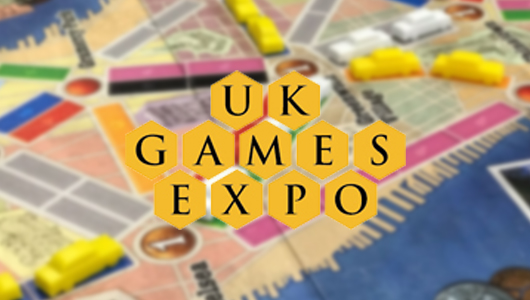We have come to the last day of UK Games Expo and, boy, it was a busy one!
If you missed any of our previous diary entries check them out from day 1 here and from day 2 here.
Pikoko (Alex)

Quite possibly my favourite game from the Expo, Pikoko is an absolutely stunning trick-taking game with a twist. If you played 2013 Spiel des Jahres winner, Hanabi, you may recognise the game mechanic of playing a card game, while being able to see everyone else’s cards but yours. In Pikoko, players are taking tricks using the cards of the player on their left. However, the objective of the game is not to take the most tricks, but just the right amount. At the start of the game, when all cards have been dealt and arranged on the beautiful peacock stands, as if there were tail feathers, players look at each other’s cards, unable to see their own, and make a bet of how many tricks each one of them will get. Then everyone begins playing cards, attempting to skew the results of the game so their bets turn out to be right.
Pikoko is simple but has a surprising level of depth to it. As a lover of trick-taking games, this is absolutely a must-have for me!
Senryaku (Tim)

An odd name and some even odder packaging, which literally does nothing to help describe the gameplay or show the game itself, are probably working against this game. However, I was glad to take the time to have a play of it as I had fun doing so. While looking a little generic, it plays slightly differently than visually similar games I’ve played. The basic aim of this two-player abstract strategy game is to get your row of marbles to the back row of your opponents starting position on the other side of the board. The catch is that the board pivots from the middle row and crashing the board hands the win to your opponent. This adds an element of dexterity to the general area movement strategy.
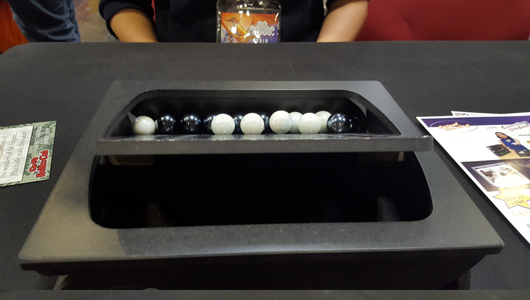
Marbles must be picked up and placed (rather than quickly rolling) and have to move orthogonally or diagonally but can never move backwards. I was taught the game rather than reading through the instructions so not entirely sure if this is the case anyway, but think you may need to supplement some house rules that marbles cannot be moved side-to-side or the same marble can’t be moved twice to avoid a stalemate. However, a fun easy to learn and quick to play the game.
Ragusa (Alex)
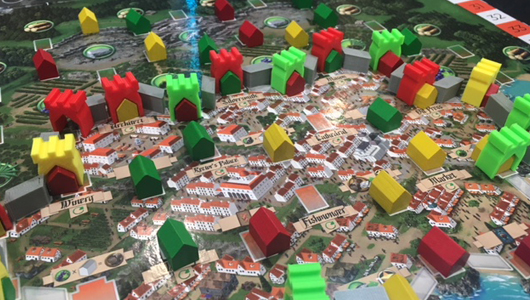
Dubrovnik, in Croatia, has been in the geek spotlight ever since it has become a setting for King’s Landing in Game of Thrones. The choice of the location is hardly surprising as its Old Town is incredibly well-preserved, whimsical and fairytale like. Now board gamers can also experience the majesty of the city, but in its Renaissance high-days as Ragusa. A Euro-style game by designer Fabio Lapiano (who was kind enough to demo the game to us and also play along), in Ragusa player places houses, walls and towers on the map, and build the beautiful city piece by piece. At first, the placements are simple – go to the locations that offer resources. However, following that players can begin building in the city itself, taking advantages of it various position like the Market and Winery, to trigger more actions and earn victory points.
Ragusa is a very interesting worker placement game and it is incredibly satisfying to see the 3D city take shape on the board the more the game progresses. I especially loved the interlocking tower pieces, which look great but also work well within the game mechanically. Also, if you lose a game, then there is not a better person to lose it to than its designer!
Startups (Tim)

Another mini sized game that seems to cram a larger concept into a very small box from the people who bought you the naughty nautically push-your-luck game Deep Sea Adventures – which dives deep but comes highly recommended if you have yet to check that out.
Startups is more of economically driven strategic set-collection game which each playing vying for the controlling share of six companies. A little bit of bluffing comes into play with the three cards in hand that you can keep hidden until the end of the round. Strategically watching and second-guessing your opponents’ moves will also come into play. It can be played over multiple rounds or as just one; and quick to play in either case for 3–7 people. I swear those little boxes is like the Tardis – even more on the inside!
Orbis (Alex)
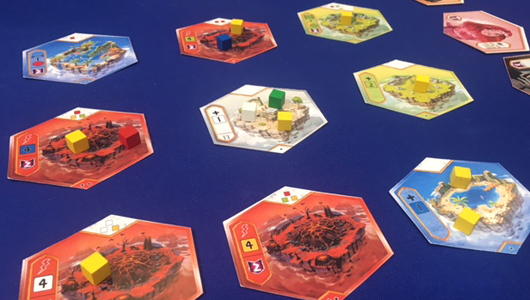
After seeing the game briefly at the Press Preview on a Thursday, I was really excited to have a play through and on a Sunday I finally managed to spot a free demo table. Orbis will immediately appeal to the fans of Century: Spice Road and Splendor. The gameplay shifts from the central market, where players can pick up tiles representing different kinds of lands, and the play area, where they build a pyramid from the tiles they picked up. At the end of the game tiles score depending on their location in the pyramid, the number of tiles of the same type or even straight up victory points. The game was still in its prototype form at the Expo, so not all of the rules have been tightened up yet. In particular, I thought the power that gives an infinite single type of resource made it a bit too easy to buy more tiles. However, even so, Orbis was tones of fun.
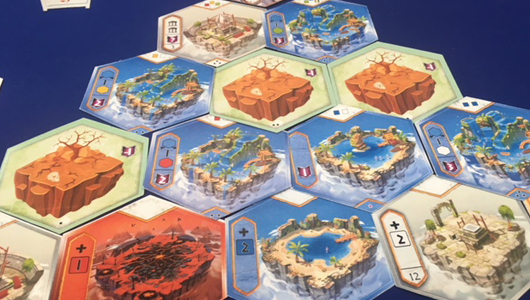
If you are looking for a light-themed strategy tile drafting game then Orbis ticks all those boxes perfectly. It’s approachable, yet still tactical gamely will attract many players and the gorgeous artwork is just the icing on an already very delicious cake.
Ticket to Ride New York (Tim)
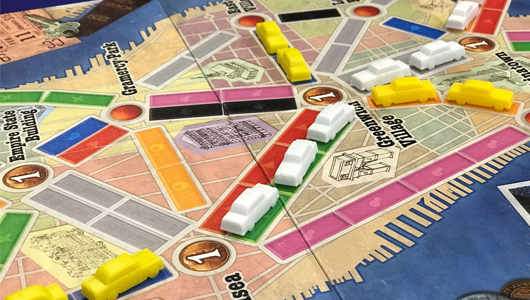
Hey! I’m walking here! But it would be quicker to take a cab, buddy! Takes all the elements of a classic game of Ticket to Ride and distills them down to a 15 minute game of laying cab routes rather than train lines. A reduced sized board of Manhattan and Brooklyn allow for increased likelihood of player interaction but the balancing of the board means that games of three players might give you more room to manoeuvre. Aside from slightly fewer ticket choices available the main gameplay variance is that there are no longer points awarded for the longest route but players get bonuses for successfully completing routes that pass through or reach tourist attraction hotspots. Hail a ride when it pulls up this summer.
Witless Wizards (Alex)
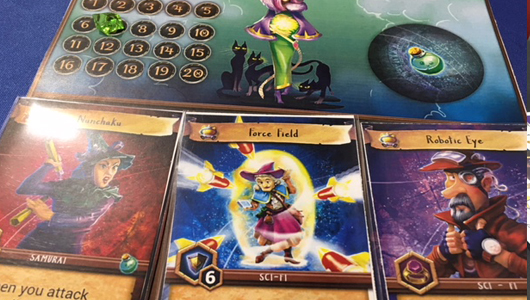
If you liked the sound of Mystic Rolls, a game I wrote about in the previous diary entry, you might also enjoy the second game from Drawlab Entertainments called Witless Wizards. Unlike Mystic Rolls, which is about young wizards learning their spells, Witless Wizards sees aging forgetful wizards battling. In the game, players fight against each other, until they get their opponent to zero health. The fighting mechanic is pretty standard: weapons deal damage, armour protects from at least some of the damage and there is a third slot for a special card that can supplement either attack or defence. The interesting part of the game, however, is that the opponent decides which cards to give you to use against them. Each player draws cards twice, one of which they have to keep and immediately equip and the other one they have to give to their opponent. So you may think that the first card you picked up is strong and so take it for yourself, only to pick up even better one in a second draw and have to give it up and then watch your opponent use it against you. Players can spend potions to pick up two cards at the same time and then choose which one to give away, but, of course, the potion supply is not unlimited.
So, yes, Abracada-what-is-it-again?! Alohomo-what! Expelli-aaaarhhhh-I-think?! Yes, all of that great stuff!
Jetpack Joyride (Tim)
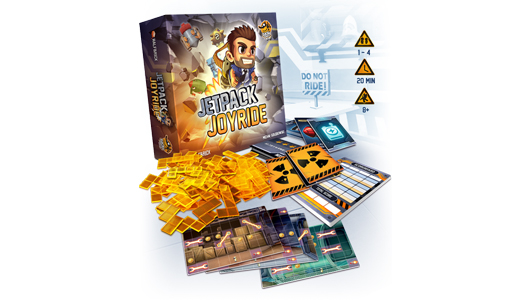
When even Mario can’t make a success out of an endless runner then it is perhaps it is time to cool your jets on a genre for a while. However, when endless runner video games were hitting their highpoint, Jetpack Joyride was widely regarded as one of the best examples of the genre and one of my personal favourites. In fact, it was a pretty tough act to follow. However, when I saw that the video game was getting a tabletop adaptation I could not help but be intrigued, to the point where it was the only appointment I made at the show.
I am pleased to say that the game not only accurately portrays the video game with an added puzzle element but is also fun in its own right. Up to four players have four sectors on boards in front of them divided into grids populated with high-fiveable scientists and obstacles such as rockets that need to be avoided. Varying missions, such as hitting the floor or ceiling level for a set number of squares, give bonus points on top of the coins collected along your path. Each round is played in real-time and players grab transparent tetronimo-style pieces that are laid end-to-end to negotiate a safe path from left to right.
When one player gets to the other side all players halt immediately and scoring is resolved. All boards are then passed to the player on your left. Before the second and third rounds, there is a nice catch-up mechanic that gives the player that is the furthest behind the first choice of upgrades that stay in play for the rest of the game. While I sucked at playing, a mark of a good game is often that I had a fun time even when I was playing it badly. Jump on for a joyride when it is available next year.
Extendebell and Hand-buildell (Alex)
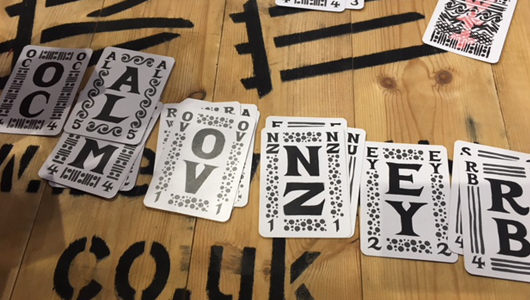
Awhile back I reviewed Wibbell++ card gaming system and talked about how more and more games will be developed for it as the time goes by. So here we are – I tried two more games at the Expo, as demoed by the always wonderful Bez.
Extendebell is another word game in the set where players race against each other to use as many cards from their deck to make words. Starting with five cards, players make up the first work from any cards, then pickup up to five again. Following that they can lay cards on top of those already on the table replacing just some of them or all to make a new word. Of course, the words can also be extended, turning from four-letter words to five, six, or as long as you can make them. Sounds easy, right? Well, it’s not and that’s exactly the fun of it!
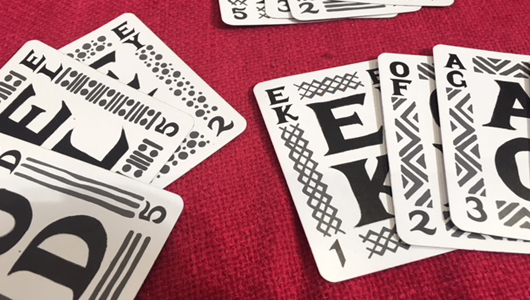
Calling Hand-buildell (although the name may still change) a word game, however, would be an oversimplification. Yes, players still try to make words using cards, get spending points for all the bottom letters they use (and those are the hardest letters to use!) and buy more cards. However, the objective is to bank sets of cards based on the numbers (at the bottom of the card) rather than the longest word or the most words. One set of Wibbell++ cards is divided in numbers between 1-5, collecting the whole set of numbers earns the player 10 points, a set with one number missing 6 points, otherwise, any banked cards are only worth a point. To buy a number 1 card, players have to make a pretty long word using only bottom letters so it will take a few rounds to get there. It is almost like building a small game engine out of letters, deciding which ones are good to keep in hand to make more words and which ones can be banked for points.
There is an advantage in knowing which letters are likely to come up in what numbered set (luckily, Bez was on hand to assist), and it may take a bit of time for new players to remember. However, Hand-buildell is exactly what I was missing from the set when it first came out. It is layered, has challenging play and takes advantages of all parts of the deck design.
Flipside (Alex)
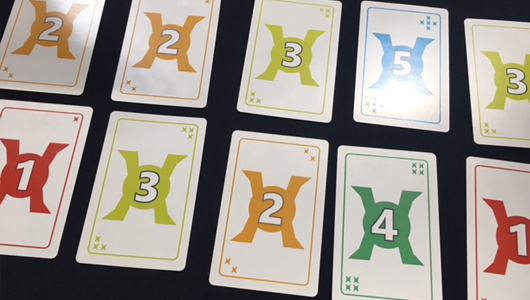
Moving swiftly from one card gaming system to another, we have Flipside a deck that currently has three games out of which I got to play the one called Chain. Every card in Flipside has a number and on the other side of the card (see what they did there?) there is a second number that can’t be the same as the one preceding it or the one following it. Chain uses that aspect of the deck at the core of its gameplay. Players lay down card on the table, creating a chain, and then flip one card to the other-side. If the flipped number matches any already on the table, then they have to pick up those cards and any others that have been separated from the rest of the chain by this action. The player with the least cards wins.
Chain may sound simple, but it can quite a bit to think about when playing!
—————————————-
There you go! This has been a crazy, yet lovely three-day rollercoaster of board game goodness!
Tags: Brain Games, BRB @ UKGE, Drawlab Entertainment, Flipside, game of thrones, Hanabi, Jetpack Joyride, Orbis, Pikoko, Ragusa, Senryaku, Starups, Ticket to Ride: New York, UK Games Expo 2018, UKGE, Wibell, Witness Wizards

